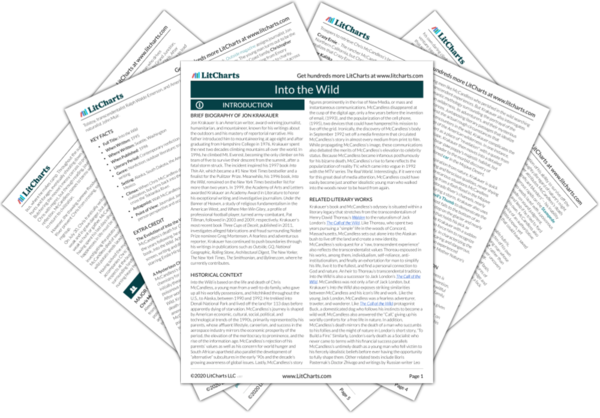McCandless's journey is part of a long tradition of men seeking to find themselves in nature, including naturalists like John Muir and writers such as Henry David Thoreau. Krakauer points out that McCandless had a particular fascination with Thoreau's Walden, an extended personal essay in which Thoreau documents his experiences living in the woods of Concord, Massachusetts. Not only did McCandless carry a heavily annotated copy of the text with him throughout his travels, like Thoreau, who lived in a secluded cabin to simplify his life, McCandless made camp at an abandoned bus in the middle of Denali National Forest in order to find himself. By closely observing the quality of animal behaviors, as well as deeply analyzing the effect of the passing seasons upon his personal development, Thoreau idealized such self-isolation within the wilderness, beautified nature, and romanticized its transformative ability, establishing an American legacy steeped in reverence for those who seek themselves in the wild.
In Into the Wild, Krakauer explores the "grip wilderness has on the American imagination" by recounting the stories of Everett Ruess, Gene Rosellini, John Waterman, and Carl McGunn, young men like McCandless who perished in the wild searching for transcendent experiences. But Krakauer also interrogates the romantic mythology surrounding the portrayal of the American wilderness, its adventurers, and their mysterious disappearances. Juxtaposing literary passages that idealize nature against the actual rough circumstances that McCandless encounters in the wild, Krakauer complicates the inspiring image of the American wilderness. In one instance, casting the desert as a place of "revelation" with a quote from Man in the Landscape, Krakauer then moves into a detailed description of the bear-paw poppy's majestic habitat, but ultimately leads the reader to the morbid discovery of McCandless's abandoned car in the Mojave Desert.
Even while drawing inspiration from nature, Krakauer is quick to point out its unforgiving and ferocious qualities, never shying away from depicting the precarious situations McCandless encounters—barely escaping from a flash flood in the Mojave Desert, getting lost in the Colorado River's channels, nearly dying off the Mexican coast during a storm. Krakauer also uses his own harrowing climb on Devil's Thumb to demonstrate the intense cruelty of nature. He almost falls to the bottom of an ice crevice when he makes a false step on the glacier and nearly plummets to his death when the ice that holds his pick ax drastically thins. Both instances choke Krakauer with a sudden fear of death at nature's hands, but also force him to recognize nature's awful power and terrible beauty. In characterizing the wilderness as both idyllic and brutally uncaring and dangerous, Krakauer underlines that whether one is an experienced mountaineer or naive explorer, all who enter Mother Nature's domain are subject to her laws.
The American Wilderness ThemeTracker

The American Wilderness Quotes in Into the Wild
In trying to understand McCandless, I inevitably came to reflect on…the grip wilderness has on the American imagination, the allure high-risk activities hold for young men of a certain mind, [and] the complicated, highly charged bond that exists between fathers and sons.
McCandless didn’t conform…well to the bush-casualty stereotype. Although he was rash, untutored in the ways of the backcountry, and incautious to the point of foolhardiness, he wasn’t incompetent—he wouldn’t have lasted 113 days if he were. And he wasn’t a nutcase, he wasn’t a sociopath, he wasn’t an outcast. McCandless was something else…. A pilgrim, perhaps.
As a youth, I am told, I was willful, self-absorbed, intermittently reckless, moody. I disappointed my father in the usual ways. Like McCandless, figures of male authority aroused in me a confusing medley of corked fury and hunger to please. If something captured my undisciplined imagination, I pursued it with a zeal bordering on obsession, and from the age of seventeen until my late twenties that something was mountain climbing….Climbing mattered.
Two years he walks the earth…an aesthetic voyager whose home is the road….After two rambling years comes the final and greatest adventures. The climactic battle to kill the false being within and victoriously conclude the spiritual revolution….Ten days bring…him to the great white north. No longer poisoned by civilization he flees, and walks alone upon the land to become lost in the wild.
















